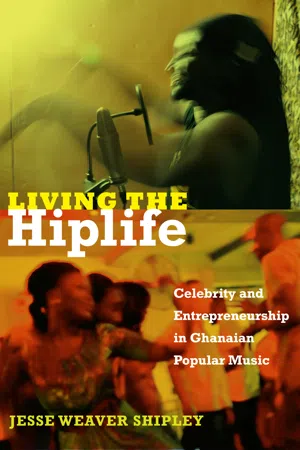
Living the Hiplife
Celebrity and Entrepreneurship in Ghanaian Popular Music
- English
- PDF
- Available on iOS & Android
About This Book
Hiplife is a popular music genre in Ghana that mixes hip-hop beatmaking and rap with highlife music, proverbial speech, and Akan storytelling. In the 1990s, young Ghanaian musicians were drawn to hip-hop's dual ethos of black masculine empowerment and capitalist success. They made their underground sound mainstream by infusing carefree bravado with traditional respectful oratory and familiar Ghanaian rhythms. Living the Hiplife is an ethnographic account of hiplife in Ghana and its diaspora, based on extensive research among artists and audiences in Accra, Ghana's capital city; New York; and London. Jesse Weaver Shipley examines the production, consumption, and circulation of hiplife music, culture, and fashion in relation to broader cultural and political shifts in neoliberalizing Ghana.
Shipley shows how young hiplife musicians produce and transform different kinds of value—aesthetic, moral, linguistic, economic—using music to gain social status and wealth, and to become respectable public figures. In this entrepreneurial age, youth use celebrity as a form of currency, aligning music-making with self-making and aesthetic pleasure with business success. Registering both the globalization of electronic, digital media and the changing nature of African diasporic relations to Africa, hiplife links collective Pan-Africanist visions with individualist aspiration, highlighting the potential and limits of social mobility for African youth.
The author has also directed a film entitled Living the Hiplife and with two DJs produced mixtapes that feature the music in the book available for free download.
Frequently asked questions
Information
Table of contents
- Contents
- List of Illustrations
- Acknowledgments
- Introduction: Aesthetics and Aspiration
- 1. Soul to Soul: Value Transformations and Disjunctures of Diaspora in Urban Ghana
- 2. Hip-Hop Comes to Ghana: State Privatization and an Aesthetic of Control
- 3. Rebirth of Hip: Afro-Cosmopolitanism and Masculinity in Accra’s New Speech Community
- 4. The Executioner’s Words: Genre, Respect, and Linguistic Value
- 5. Scent of Bodies: Parody as Circulation
- 6. Gendering Value for a Female Hiplife Star: Moral Violence as Performance Technology
- 7. No. 1 Mango Street: Celebrity Labor and Digital Production as Musical Value
- 8. Ghana@50 in the Bronx: Sonic Nationalism and New Diasporic Disjunctures
- Conclusion: Rockstone’s Office: Entrepreneurship and the Debt of Celebrity
- Notes
- Bibliography
- Index